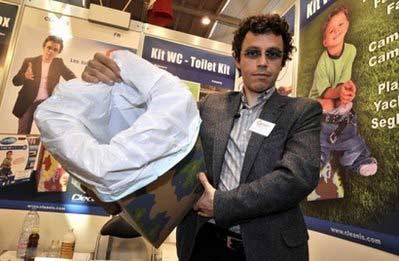|
 France's Laurent Helewa poses with his invention, a toilet kit, during the opening day of the 39th International Exhibition of Inventions, on April 6 in Geneva. The French have been credited with inventing the bidet and popularising pissoirs or public urinals, and now they can add the biodegradable and portable toilet to their name.(Agencies) |
|
The French have been credited with inventing the bidet and popularising pissoirs or public urinals, and now they can add the biodegradable and portable toilet to their name. Frenchman Laurent Helewa designed the lightweight, easy to construct and carry toilet after Hurricane Katrina, when thousands of displaced people were crammed into a stadium for a week, with hardly any access to facilities. "It's a taboo subject, but necessary in case of natural disasters," he told the reporters at the annual International Exhibition of Inventions in Geneva, pointing to the earthquakes in Japan and Haiti that displaced tens of thousands of people. "The first problem is to have access to a toilet. Because if not, people will do their business wherever, and you end up with epidemics such as cholera," said Helewa, who is a doctor. Weighing about two kilogrammes (4.4 pounds), his invention is essentially a piece of cardboard that folds into a boxed seat in a minute, and comes with plastic bags that each contain an absorbent pad to soak up liquids. Helewa, who gamely climbed atop a sample, claimed that the heavy-duty version is able to withstand a weight of 200 kg and usage of 20 hours a day, after it was tested by four armies. The French invention is among more than 1,000 creations showcased by inventors from 45 countries at this week's inventions fair in Geneva. (Read by Lee Hannon. Lee Hannon is a journalist at the China Daily Website.) (Agencies) |
法國(guó)人曾以發(fā)明坐浴盆、以及普及公共廁所而著稱(chēng),如今,他們又可以因?yàn)榭缮锝到獾摹氨銛y廁所”而讓人稱(chēng)贊了。 法國(guó)人洛朗?海萊瓦在卡特里娜颶風(fēng)過(guò)后設(shè)計(jì)了這款輕便、易于使用和攜帶的“便攜廁所”。卡特里娜颶風(fēng)來(lái)臨時(shí),成千上萬(wàn)流離失所的人們?cè)谝粋€(gè)體育場(chǎng)擠了一周,而且無(wú)處如廁。 他在參加日內(nèi)瓦年度國(guó)際發(fā)明展時(shí)告訴記者:“這個(gè)發(fā)明也許讓人忌諱,但在遇到自然災(zāi)害時(shí)卻非常有用。”此前,發(fā)生在日本和海地的地震讓數(shù)萬(wàn)人無(wú)家可歸。 身為醫(yī)生的海萊瓦說(shuō):“頭等大事是找到廁所。因?yàn)槿绻也坏剑藗冎坏秒S地解決,這會(huì)導(dǎo)致霍亂等傳染病的出現(xiàn)。” 這款便攜廁所重約兩公斤(4.4磅),使用者可以將構(gòu)成廁所的一片紙板在一分鐘內(nèi)折成一個(gè)盒狀座位。座位內(nèi)部放著若干塑料袋,每個(gè)塑料袋都有可吸收液體的吸水墊。 海萊瓦還勇敢地坐在一個(gè)樣品上展示了一番,稱(chēng)這款便攜廁所非常結(jié)實(shí)耐用,能夠承受200公斤的重壓,一天可以使用20個(gè)小時(shí),曾在四支軍隊(duì)中做過(guò)測(cè)試。 在本周的日內(nèi)瓦發(fā)明展上,來(lái)自45個(gè)國(guó)家的發(fā)明者共展出了一千多件展品。 相關(guān)閱讀 聯(lián)合國(guó)報(bào)告:印度廁所不如手機(jī)普及 全日空國(guó)際航線將設(shè)女士專(zhuān)用衛(wèi)生間 泰國(guó)學(xué)校為異裝癖者設(shè)立專(zhuān)用廁所 (中國(guó)日?qǐng)?bào)網(wǎng)英語(yǔ)點(diǎn)津 許雅寧 編輯:馬文英) |
|
Vocabulary: bidet: 坐浴盆 pissoir: 公共廁所(法語(yǔ)),意同該句中的public urinal gamely: in a brave or sporting manner(勇敢地,勇于承擔(dān)地) heavy-duty: providing an unusual amount of power, durability, etc(結(jié)實(shí)的,耐用的) |
